Your partner for physical therapy in Eagle, Idaho.
The team at Therapeutic Associates Physical Therapy – Eagle strives to ensure every patient understands how their plan of care supports their personal goals beginning with the very first appointment.
“When someone comes in for their first visit, we’re going to ask lots of questions about what’s been going on,” said physical therapist and practice manager Mindy English. “Most of the time we see people who are recovering from an injury or a surgery, but we also see people who are looking to improve their performance, let’s say in a sport like running, as well as those who are just looking for some wellness advice.”
Whatever brings a patient to the clinic, their story is what drives their treatment plan.
“Shared decision making is where we really have those conversations about what you value as a person, what you feel might be helpful for you in combination with my experience of what I have seen to be helpful and the tools I have to help you achieve your goals,” Mindy explained.
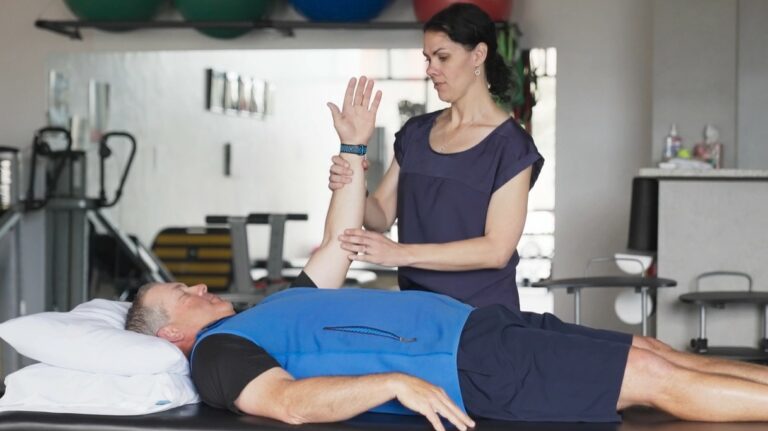
Once a patient’s history and goals have been thoroughly reviewed, their PT conducts a physical exam to see how they are moving and identify any dysfunction. If an injury or pain is what led a patient to PT, then the therapist will work to get to the root of the problem during this part of the assessment.
“Once we’ve done the evaluation and figured out what a patient’s goals are, we like to work collaboratively with the patient to come up with a plan to get them to those goals,” Mindy noted. “I would say I get to be the expert in your musculoskeletal function and you’re the expert of your body. So, we’re going to work together to get you back to what you want to do.”
Patient goals often revolve around activities they are struggling with, which may be simple, functional tasks like going up and down stairs, bending and squatting to pick things up, or getting in and out of a car, or they may be more sports-performance-based such as running, biking or skiing.
Whatever they are working toward, patients are equipped with an understanding of how their physical therapy plan is specifically designed for them.
“Patient education is probably the most important thing we do in physical therapy because if people don’t understand what is going on and the ‘why’ behind what we are doing — if they don’t understand how it correlates to them getting back to playing with their kids or whatever it is they want to get back to — they’re not going to be as successful in physical therapy,” Mindy said.
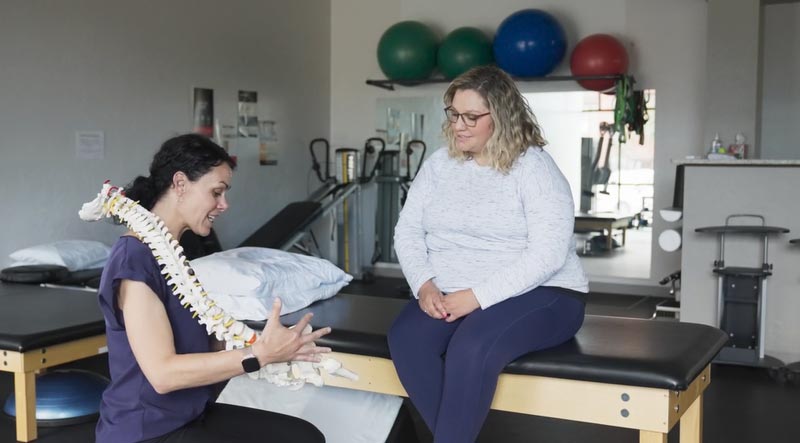
A patient’s success depends not only on their commitment during their in-clinic appointments, but also on their commitment to their home exercise program.
“Just like a doctor might prescribe a medication, we’re going to prescribe some movements that will be the most beneficial for a patient to work on in between appointments, which are once, twice or three times a week,” Mindy explained.
Without the home program, she added, patients are at risk of falling into old movement patterns rather than continuing to work toward their goals. Therefore, ensuring that the home program is working for a patient is a priority during follow-up visits.
“We check in every visit to see how you are doing — Are we making progress toward your goals? What’s better since last time? What’s not better since last time? What do you feel is still missing? What’s working and what’s not? And we ask how things are going, not just with physical therapy, but about what is going on in your life,” Mindy said. “We get the advantage of having a lot of time with our patients compared to other healthcare providers, and so we have the opportunity to get to know people well.
“It’s my goal to learn something new about a patient every day – to learn some new fun fact that they might be able to share.”
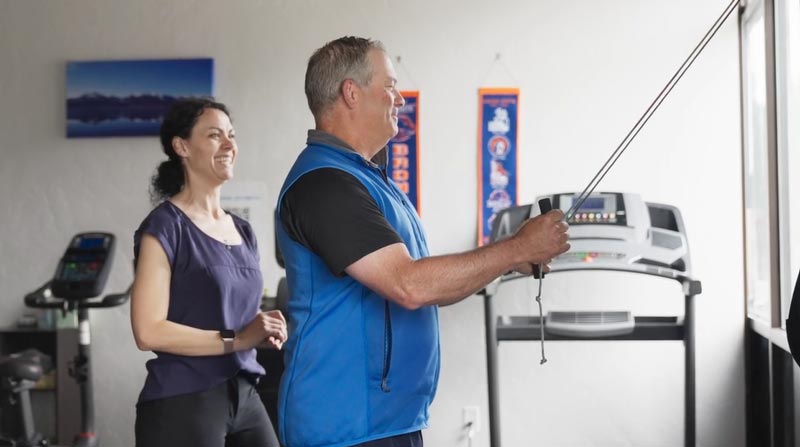
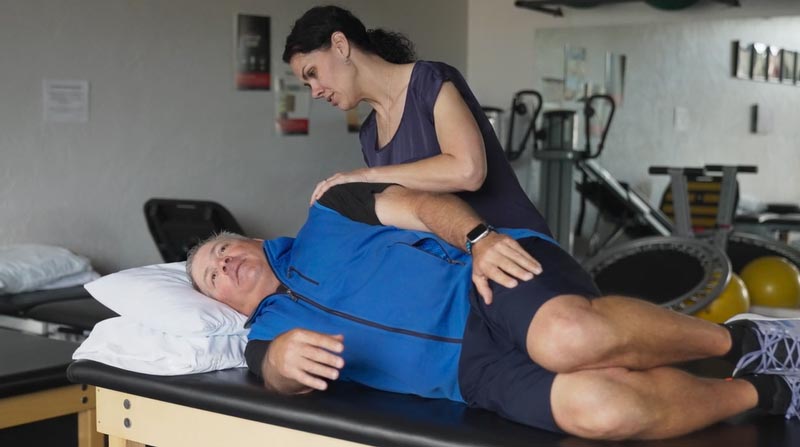
Building this type of personal relationship with patients not only reinforces that their PT care team strives to always treat them as a whole person rather than a number on a schedule, but also lends space for them to share parts of their story that they may not have realized were important during their intake and evaluation. Sometimes those little revelations lead to revisions in their treatment plan.
A runner who is being treated for hip pain, for example, may not realize that an ankle injury they had years before could be contributing to their current condition. Simply asking them about what races they’ve run prompts them to bring up this old injury they had during a race that they didn’t mention before.
While open communication between a patient and their physical therapist is important, there is added value in having an entire care team invested in a patient’s journey.
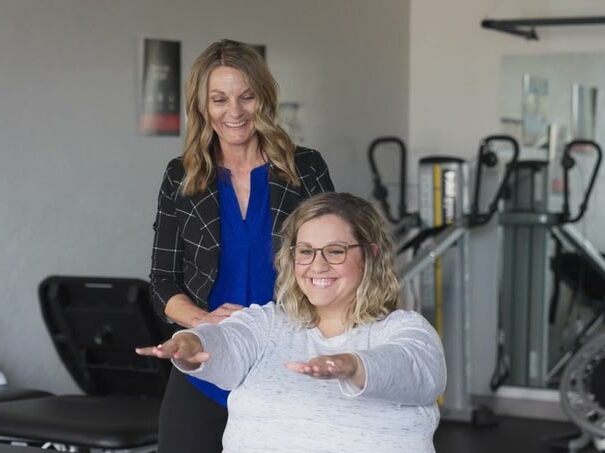
As part of the care team, physical therapy assistant Lisa Holden Jackson works with patients to ensure they understand their exercises and are moving their bodies correctly throughout each movement.
Providing cues and feedback as she guides patients in their exercise form is her top priority, but connecting with them on a personal level allows Lisa the chance to uncover any unspoken challenges they may be facing either with certain movements or with understanding how a movement is related to their goals.
“That education is a huge part of our team approach,” Lisa emphasized. “It’s fun for me to teach them how to move their bodies, to be helping them get their strength and mobility back so they can do the activities they want to do. Then they are able to take that and use it in their daily lives.”
It is important to the care team that every patient leaves the clinic on their last day empowered with the knowledge of what their body can do and confident that they have the tools to continue their care on their own. The hope, of course, Mindy said, is that they are close to 100 percent by the end of their PT journey in the clinic, but that they are also walking away with their home exercise plan updated and equipped with ideas for ways to progress their movements as they feel better to make them harder, or how to modify them if they need them to be easier.
“We also want a plan in place so you know you can contact me if something isn’t going well,” Mindy emphasized, noting that one of the biggest myths about physical therapy is that you have to be injured or in a lot of pain to seek the help of a PT.
Sometimes, she said, it’s about pain and injury prevention, especially in advance of a big event such as running a race or in preparation for a sports season.
“There is always a lot we can do even if you’re not hurt or in pain. There are things we can look at and make sure we are setting you up for success in the future.”

Get moving with physical therapy.
At Therapeutic Associates Physical Therapy – Eagle, we are committed to providing effective, efficient, and compassionate care to help patients of all ages and abilities live a pain-free, active life.
